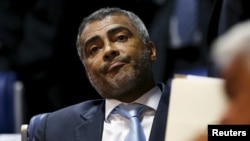The United States has infuriated some of its closest allies in recent years by fining their banks and spying on their citizens. But its latest extraterritorial salvo, a crackdown on graft at soccer's global governing body, is winning wide applause abroad.
Following news Wednesday that the U.S. Justice Department, supported by FBI investigators, was charging nine current and former FIFA officials with illegal payments, kickbacks and bribes, the Twittersphere was flooded with rare cheers of approval for the "world's policeman."
Fans of the "beautiful game" — the world's most popular sport but outside the sporting mainstream in the United States — also questioned why countries with a richer soccer tradition had turned a blind eye to suspicions of corruption for so long.
Some dissenting voices came from Russia, due to host the World Cup in 2018, and China. But across much of Europe and Latin America, the regions that have produced every World Cup winner since the tournament was first established in 1930, the U.S. was saluted.
Even in FIFA's home country of Switzerland, which has endured a U.S. assault on its cherished tradition of banking secrecy, there were strong signs of support for the crackdown and calls for the body's longtime president Sepp Blatter, a Swiss himself, to resign.
"It's embarrassing for the rest of the world," said Martin Daepp in a reader comment on the website of Swiss daily Neue Zuercher Zeitung. "The energy the USA is devoting to a sport that has been so unimportant there is stunning. Still, football fans will thank the USA for this."
"Somebody had to catch them"
Former stars of the game, from Brazil's Romario and Argentina's Diego Maradona to Portugal's Luis Figo — who has accused Blatter of running FIFA like a dictator — applauded the move, which started with a dawn raid on a FIFA congress in Zurich on Wednesday and the arrest by Swiss police of seven senior officials who now face extradition to the United States.
"Unfortunately it wasn't our police who caught them, but somebody had to catch them. Thieves have to go to jail," said Romario, who was on the team that won the World Cup in 1994 and is now a senator in Brazil.
U.S. law gives its courts broad powers to investigate crimes committed by foreigners on foreign soil if money passes through U.S. banks or other activity takes place there.
"If the United States doesn't do it, no one does," said Manuel Bonilla, 62, a shoe shiner working in the main park of Tegucigalpa, Honduras.
"It doesn't matter that the U.S. is policing the world again, this is good news for football," said Fernando Toledo, 49, who was shopping near Bogota, Colombia.
"Never thought I'd say this, but thank goodness for the FBI," tweeted Dan Steele of Carshalton Beeches in Britain.
France accused the United States of strong-arm tactics last year when it imposed a record $8.9 billion fine on French bank BNP Paribas for violating Iran sanctions. But the FIFA case was seen in a very different light.
Foreign Minister Laurent Fabius said the corruption allegations had given FIFA a "disastrous image" and urged it to delay a vote scheduled for Friday that was expected to return Blatter, 79, for a fifth term as president.
Paper tells Blatter: "Get lost!"
In Germany, winners of the 2014 World Cup, revelations of U.S. spying, including the bugging of Chancellor Angela Merkel's mobile phone, have fueled waves of anti-American sentiment of late. However, the FIFA crackdown was hailed as long overdue.
"Get lost!" top-selling daily Bild blared on its front page next to a picture of Blatter.
"If football can't clean itself up, then governments have to step in," German Foreign Minister Frank-Walter Steinmeier said during a visit to Portugal.
Swiss television reports on the scandal referred repeatedly to "aggressive" U.S. judicial tactics that had given the government in Berne little choice but to cooperate on the U.S. extradition requests.
But Christian Levrat, president of Switzerland's Social Democratic Party and a member of a parliamentary commission looking into corruption, welcomed the crackdown, saying FIFA was a "latent danger" to the image of the entire country.
The United States took jurisdiction of the case partly because the Internal Revenue Service and the FBI secured the cooperation of Chuck Blazer, a former top FIFA official and U.S. citizen, who officials said had not paid taxes for years.
Still for some, it was galling to see a country that prefers baseball, basketball and its own American version of football to soccer crack down on the sport.
"Soccer [or what most of the world calls football] is barely an American game," John Hempton, manager of Australian hedge fund Bronte Capital wrote in a note to clients. "This is just anti-democratic. We non-Americans did not vote for the U.S. laws and the U.S. legal system is not responsive to our votes."





